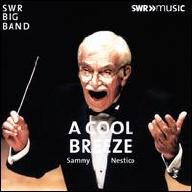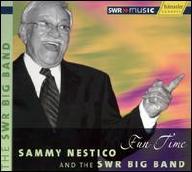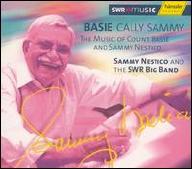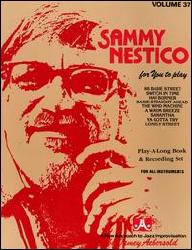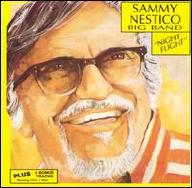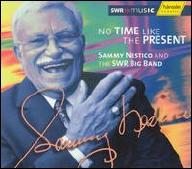Born Samuel Louis Nestico in 1924, Nestico grew up in Pittsburgh during the Depression and became obsessed with big-band music while listening to the radio as a child. Influenced by Tommy Dorsey, he started playing trombone in the eighth-grade school band. By his sophomore year of high school, he was already playing local big-band gigs and at age 17, he joined the orchestra at Pittsburgh's ABC-affiliated WCAE radio station. Self-taught on piano, he learned how to arrange by analyzing recordings by Dorsey, Sy Oliver, and others. Despite his lack of formal training, he quickly earned the position as the orchestra's staff arranger. In 1946, he joined Charlie Barnet's big band, and spent several months playing in the trombone section and arranging. However, by the fall of that year, upon the urging of his mother, he returned to Pittsburgh and enrolled at Duquesne University where he graduated in 1950 with a degree in music education. He then worked as a teacher for a year before enlisting in the Air Force Band in Washington, D.C. Nestico spent the next 15 years in the Air Force, eventually becoming the leader of the acclaimed big band the Airmen of Note. After leaving the Air Force, he spent five years leading the Marine Band. While with the Marines, he discovered that his original family name was spelled Nistico, and that he was cousins with Count Basie saxophonist Sal Nistico. Following a meeting with the reedist, he began writing charts for Basie, culminating in the 1968 album Basie Straight Ahead. During this period, he moved to California and continued to build his association with Basie, recording ten albums with the band including 1969's Standing Ovation, 1971's Have a Nice Day, 1981's Grammy-winning Warm Breeze, and 1983's Grammy-winning 88 Basie Street. He also garnered film, television and commercial work, supplying music for such shows as Mannix, Charlie's Angels, and The Mod Squad.
While with Basie, Nestico made his debut as leader with 1982's funky big band album, Dark Orchid, followed by 1986's Night Flight. He then gathered an all-star West Coast ensemble featuring trumpeter Conte Candoli, trombonist Bill Watrous, saxophonists Pete Christlieb and Bud Shank, drummer Louis Bellson, and pianist Victor Feldman for 1988's Big Band Favorites of Sammy Nestico. The '80s also found Nestico working with other performers, including arranging for Toni Tennille's 1984 big-band album More Than You Know. He also saw his arrangements recorded by Frank Sinatra, Pat Longo, Buddy Rich, Louis Bellson, Patti Austin, Barbra Streisand, and many others.
In the '90s, Nestico returned to education, working as a professor at the University of Georgia where he taught commercial orchestration and conducted the studio orchestra. He also helmed music programs at Los Angeles Pierce College and Westinghouse Memorial High School in Wilmerding, Pennsylvania. In 1993, he published the textbook The Complete Arranger. He has been honored three times by his alma mater Duquesne University, including being bestowed with an honorary Doctor of Music degree, the Distinguished Alumni award, and, in 1994, being inducted into the school's "Century Club".
Along with teaching, he continued to garner acclaim for his swinging arrangements, picking up two more Grammy nominations for his work on 2002's This Is the Moment. He also joined Germany's SWR Big Band for 2005's No Time Like the Present, and 2005's Basie Cally Sammy: The Music of Count Basie and Sammy Nestico. Similar work followed with Britain's BBC Big Band, Germany's NDR Big Band, and Denmark's DR Big Band. He was further nominated for Grammys for 2009's Fun Time with the SWR Big Band and 2015's A Very Swingin' Basie Christmas! with Scotty Barnhart and the Count Basie Orchestra. He has also worked with such modern-day crooners as Michael Buble, Matt Dusk, and Daniel Rodriguez. In 2017, he reunited with the SWR Big Band for A Cool Breeze. ~ Matt Collar, Rovi


